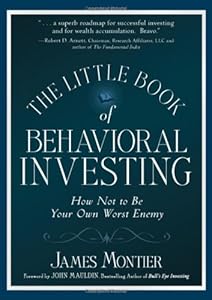Stop Listening to the Experts!
“Too much of anything can destroy you.” Famous words from the City of Lost Souls. And how true they are! James Montier, author of The Little Book of Behavioral Investing: How not to be your worst enemy, doles out more cheer for us in Chapter 4. This time he uses unequivocal research data to turn the spotlight on another human vulnerability that makes us shoddy investors. It’s “over-confidence.”
The key lesson from this chapter wasn’t a very happy one for me. In fact, it was depressingly accurate, as proven by history. Let me explain.
Research proves that people (and I include myself here) often take dimwitted, brash, even inhumane actions if it conforms to an authority figure’s opinion or instruction. So tremendous is the influence of authority that it completely overrides our capacity to self-judge and cogitate.
Montier gives a chilling example: In the 1960s, Stanley Milgram conducted experiments to understand why ordinary people executed the detestable policies of leaders in World War II. A scenario was recreated where a “teacher” in authoritative attire instructed a “student” to press switches that increasingly raised the voltage level of shocks applied to “learners.” Voltage levels were clearly marked on the switches with descriptions ranging from “Slight” to “Danger: Severe Shock” to “XXX.” The students were told that that the aim of the experiment was to study the effect of punishment on learning and memory.
One would think that no student would have gone beyond the “Extreme Intensity Shock” level, especially since shock deliveries were accompanied by auditory reactions of the student that ranged from grunts to agonized screams. But what do you think happened?
Shockingly, 100% of the “ordinary people” willingly went up to 135V either themselves or by instructing another person, a stranger to them. This level was beyond the point where the learner asks to be released. Almost 80% were ready to go up to 280V where they could hear screams and 62% were willing to go up to XXX.
Such is the dangerous, brain-debilitating influence of authority.
And what is authority really? Usually, nothing more than over-confidence delivered with aplomb. Doctors do it all the time as do politicians and investment experts on Dalal Street. They get away with making fools of us because we get taken in by authority.
Montier warns us to be skeptical of experts, especially if they are fund managers. Take the example of Joe Granville, legendary market-timer and technical analyst. He started off well and gained credibility but the consistency of his predictions soon wore off. While his skill fumbled, his confidence did not. As long as he kept up his showmanship and appeared confident of his outlook, he was never short of gullible believers.
Montier outlines another experiment. Students and fund managers were pitted against each other to test stock-picking skills. Each team was handed research data on each blue-chip stock – name, industry, and prior 12 months’ performance. The students claimed 59% confidence in their skills and the professionals 65%. Not surprisingly, the students performed sub-optimally at less than 50%, relying on guessing games. But fire and brimstone! The professionals picked the right stock less than 40% of the times!
This happened because of the professionals’ over-confident reliance on “other knowledge” apart from what was handed to them. These are the very people who feature across media, glibly advising us on our investment strategies. Why, we’d be better off playing tic-tac-toe ourselves!
So we’re back to the game plan. Beat this hurdle by sticking to your investment plan, disregarding expert drones, and ignoring what others are doing.
But I can’t end this review without an interesting mention (it’s too irresistible): Turns out that men are more prone to over-optimism and over-confidence. They are not only worse investors than women but also a bad influence during investment decision-making. Don’t believe me? All hail to Montier and his penchant for research results! Zoom in to Chapter 4.
Monica Samuel is doing a chapter-wise review of the book: The Little Book of Behavioral Investing: How not to be your worst enemy by James Montier. You can follow the series by following this tag: tlbbinvesting or by subscribing to this rss feed: tlbbifeed

